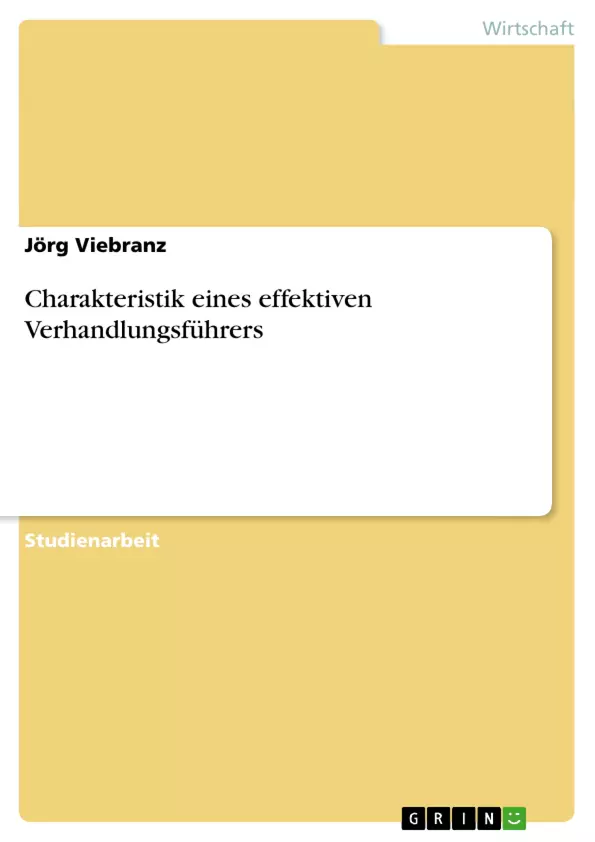Welche Fähigkeiten oder Eigenschaften hat ein effektiver, überdurchschnittlicher Verhandlungsführer, die ihn von einem nur durchschnittlichen Verhandlungsführer unterscheiden? Woher kommen diese Eigenschaften? Und wie wirken sie sich aus? Das sind die Kernfragen, um die sich diese Arbeit dreht. Es geht also vor allem darum, was ein überdurchschnittlicher Verhandlungsführer einem durchschnittlichen voraushat und warum seine Verhandlungsergebnisse effektiver sind als andere.
Es scheint schwer, einen bestimmten Typ als guten Verhandlungsführer bezeichnen zu können. Denn, jemand, der sich in der einen Verhandlungssituation als erfolgreich erweist, kann in der anderen vielleicht vollkommen inkompetent sein. Beispielsweise mag ein Manager für sein Unternehmen die profitabelsten Geschäfte aushandeln, bei den Verhandlungen mit seiner Frau über die Erziehung ihrer Kinder kann er aber völlig unterliegen. Triumph in der einen und Versagen in der anderen Verhandlungssituation schließen sich also nicht gegenseitig aus. Dies führt zu der Schlussfolgerung, dass effektive Verhandlungsführung kein Persönlichkeitsmerkmal, sprich: nicht angeboren ist.
Effektives Verhandeln ist also mehr durch (erlernbare) Fähigkeiten (skills), als durch die Persönlichkeit der Verhandelnden beeinflusst. Welches diese Fähigkeiten im Einzelnen sind, und wie sie sich auf Verhandlung und Verhandlungsergebnis auswirken können, soll hier deutlich gemacht werden. Einige Autoren haben sich darüber Gedanken gemacht, welche Eigenschaften einen effektiven Verhandlungsführer auszeichnen. Diese Eigenschaften wurden von ihnen in Listen zusammengestellt. Einige werden in der Arbeit wiedergegeben. Sie werden zusammengefasst und die unterschiedlichen Eigenschaften in Überkategorien eingeordnet. Dann wird zu jeder dieser Kategorien ein kurzer Überblick gegeben, wie sich die Eigenschaften auf den Verhandlungsverlauf auswirken können, und dadurch, warum ein Verhandlungsführer effektiver ist, wenn er über diese Eigenschaften verfügt.
Inhaltsverzeichnis
- EINLEITUNG
- LISTEN MIT EIGENSCHAFTEN UND FÄHIGKEITEN EFFEKTIVER VERHANDLUNGSFÜHRER ...
- ZUSAMMENFASSUNG DER LISTEN .....
- VORBEREITUNGS- UND PLANUNGSFÄHIGKEITEN.
- KOMMUNIKATIONSFÄHIGKEITEN.
- FÄHIGKEIT VERTRAUEN ZU ERWECKEN..
- KREATIVITÄT UND OFFENHEIT FÜR (UNGEWÖHNLICHE) PROBLEMLÖSUNGEN.
- SELBSTVERTRAUEN...
- EMOTIONEN UND SELBSTBE HERRSCHUNG
- FÄHIGKEIT ZU ÜBERZEUGEN..
- KURZE ZUSAMMENFASSUNG UND SCHLÜSSE ..........
- LITERATURVERZEICHNIS
Zielsetzung und Themenschwerpunkte
Diese Arbeit befasst sich mit den Eigenschaften und Fähigkeiten eines effektiven Verhandlungsführers. Sie analysiert, was einen überdurchschnittlichen Verhandlungsführer von einem durchschnittlichen unterscheidet, woher diese Eigenschaften stammen und wie sie sich auf den Verhandlungsprozess auswirken. Die Arbeit stellt heraus, dass effektives Verhandeln weniger von Persönlichkeitsmerkmalen als vielmehr von erlernbaren Fähigkeiten (skills) geprägt ist.
- Analyse der Eigenschaften und Fähigkeiten eines effektiven Verhandlungsführers
- Untersuchung der Ursprünge dieser Eigenschaften und Fähigkeiten
- Bedeutung von erlernbaren Fähigkeiten für den Verhandlungserfolg
- Einteilung der Fähigkeiten in verschiedene Kategorien
- Auswirkungen der Fähigkeiten auf den Verhandlungsprozess
Zusammenfassung der Kapitel
- Einleitung: Diese Einleitung führt in das Thema der Arbeit ein und stellt die Kernfragen dar, um die es geht. Sie definiert Verhandlung als einen Prozess der interpersonellen Entscheidungsfindung, bei dem knappe Ressourcen aufgeteilt werden. Die Einleitung betont, dass es keine feste Definition eines guten Verhandlungsführers gibt, da Erfolg in einer Verhandlungssituation nicht automatisch Erfolg in einer anderen garantiert. Sie argumentiert, dass effektive Verhandlungsführung eher durch erlernbare Fähigkeiten als durch angeborene Persönlichkeitsmerkmale bestimmt wird.
- Listen mit Eigenschaften und Fähigkeiten effektiver Verhandlungsführer: Dieses Kapitel präsentiert Listen mit Eigenschaften und Fähigkeiten, die von verschiedenen Autoren als Merkmale eines effektiven Verhandlungsführers identifiziert wurden. Die Listen umfassen Punkte wie Vorbereitung und Planung, Kommunikationsfähigkeit, Vertrauensbildung, Kreativität, Selbstvertrauen, emotionale Kontrolle, Überzeugungskraft und andere Fähigkeiten.
Schlüsselwörter
Verhandlungsführung, Fähigkeiten, Eigenschaften, effektives Verhandeln, Vorbereitung, Planung, Kommunikation, Vertrauen, Kreativität, Selbstvertrauen, emotionale Kontrolle, Überzeugungskraft, Listen, Kategorien, Analyse, Verhandlungserfolg.
Häufig gestellte Fragen
Ist die Fähigkeit zur effektiven Verhandlungsführung angeboren?
Nein, die Arbeit kommt zu dem Schluss, dass effektives Verhandeln primär auf erlernbaren Fähigkeiten (Skills) basiert und nicht ein starres Persönlichkeitsmerkmal ist.
Welche Kategorien von Fähigkeiten zeichnen gute Verhandler aus?
Wichtige Kategorien sind Vorbereitungs- und Planungsfähigkeit, Kommunikationsstärke, Vertrauensbildung, Kreativität, Selbstvertrauen und emotionale Selbstbeherrschung.
Warum ist Vorbereitung für den Verhandlungserfolg so entscheidend?
Eine gründliche Planung ermöglicht es, eigene Ziele klar zu definieren, Alternativen abzuwägen und in der Verhandlungssituation flexibler auf Argumente zu reagieren.
Welche Rolle spielen Emotionen in einer Verhandlung?
Selbstbeherrschung ist wichtig, um sachlich zu bleiben. Ein effektiver Verhandlungsführer kann seine Emotionen kontrollieren und so verhindern, dass hitzige Situationen das Ergebnis gefährden.
Wie wirkt sich Kreativität auf Verhandlungsergebnisse aus?
Kreative Verhandler sind offen für ungewöhnliche Problemlösungen (Win-Win-Ansätze), die über das bloße Aufteilen starrer Ressourcen hinausgehen.
Kann man in einer Situation erfolgreich und in einer anderen inkompetent sein?
Ja, ein Manager kann geschäftlich brillant verhandeln, aber privat (z. B. bei der Erziehung) scheitern, da jede Situation spezifische Anforderungen stellt.
- Quote paper
- Jörg Viebranz (Author), 2003, Charakteristik eines effektiven Verhandlungsführers, Munich, GRIN Verlag, https://www.grin.com/document/40464



